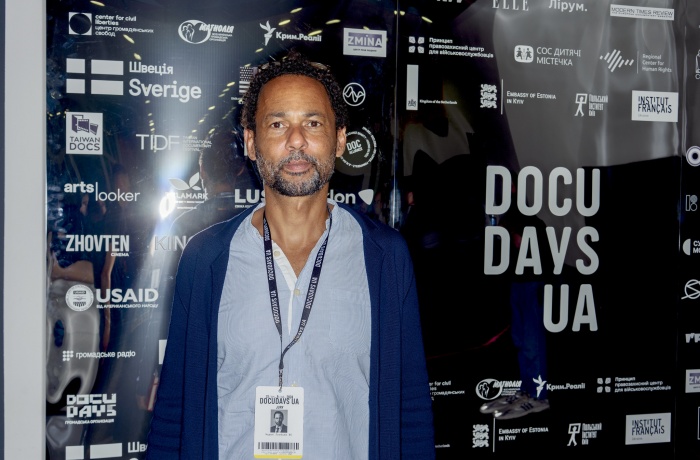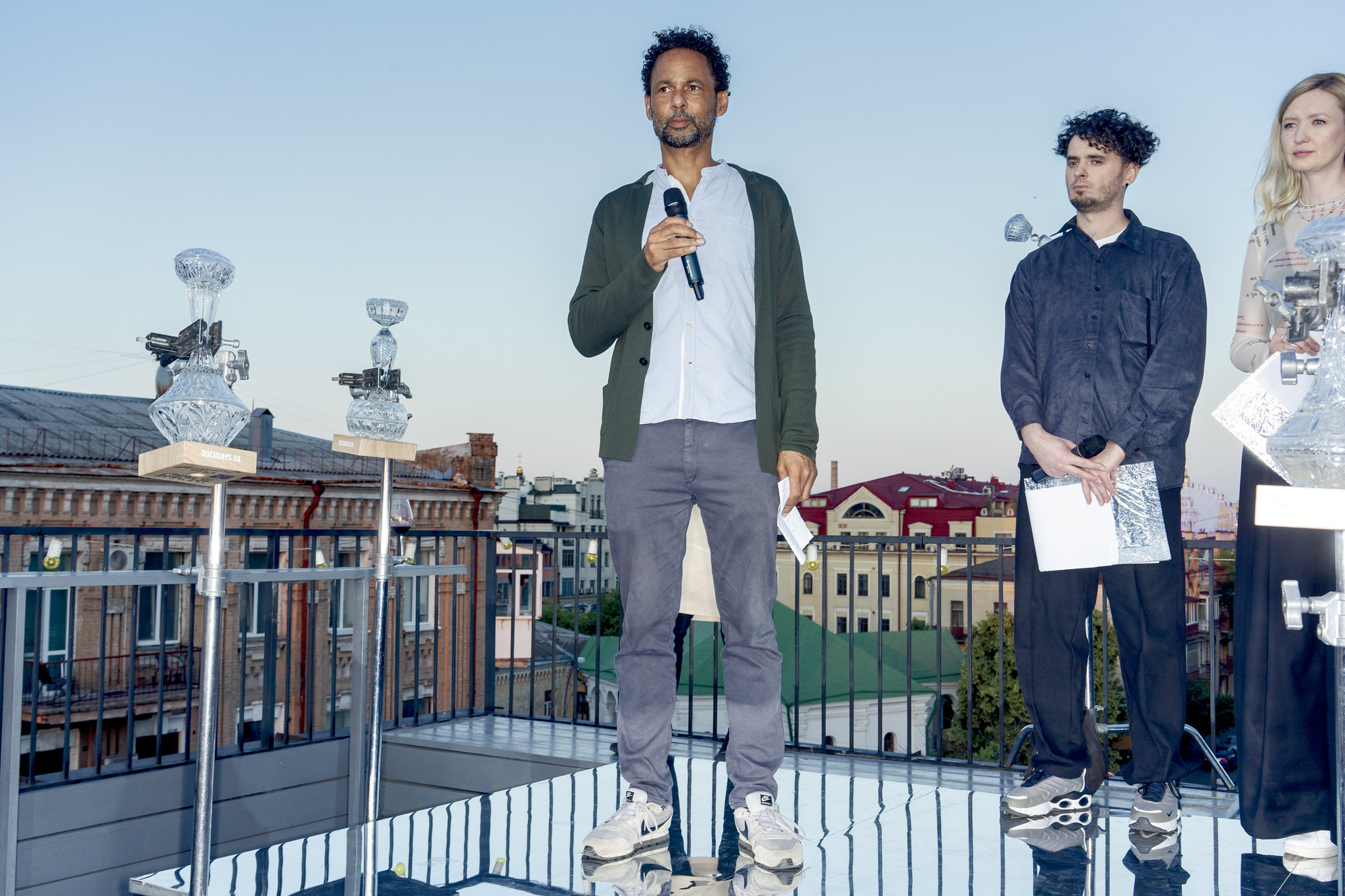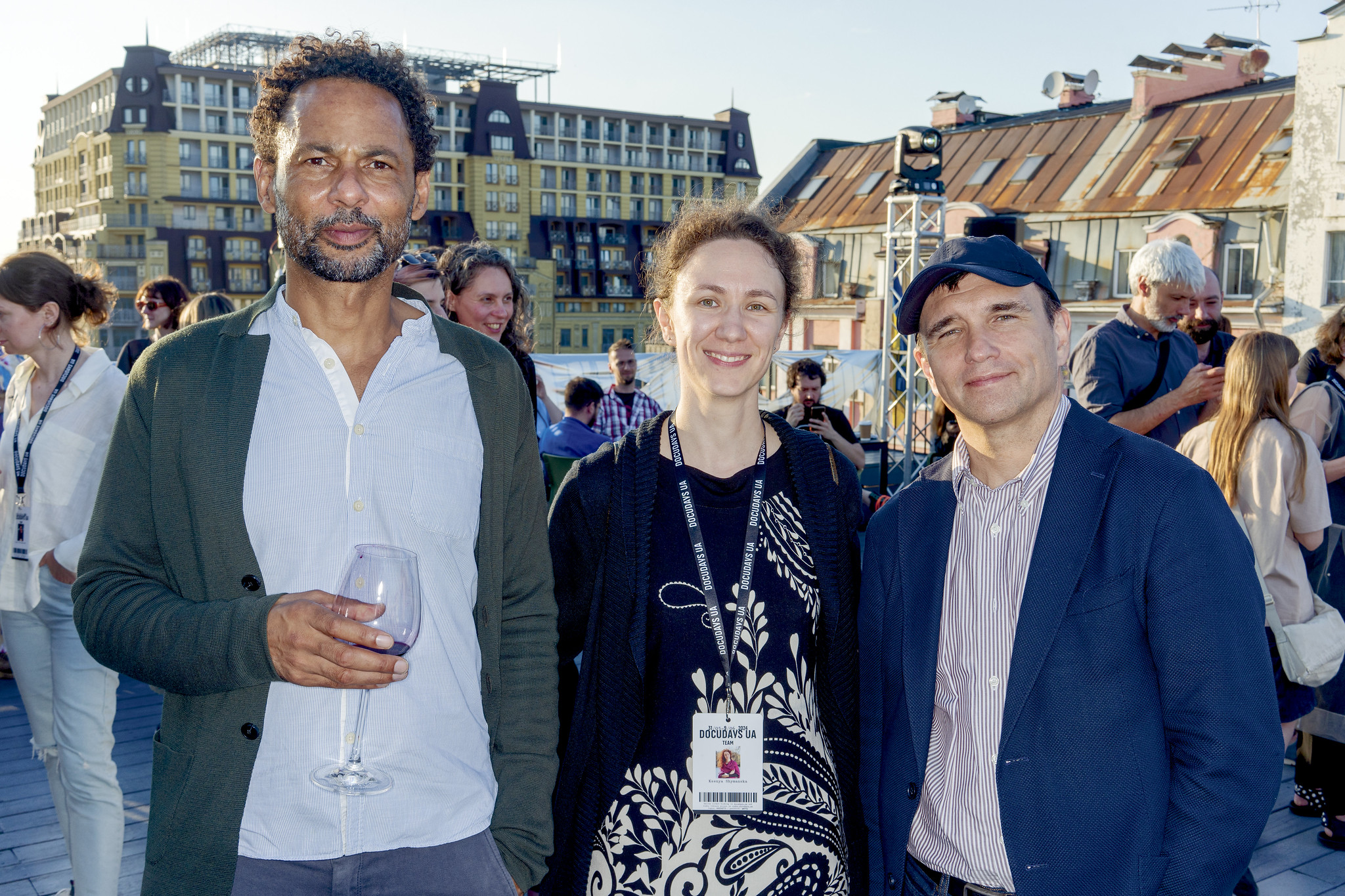
This year Docudays UA had four juries, and, as usual, one of them is focused on films about human rights. The Rights Now! jury watched ten films about dignity, freedom, and equality from different festival programmes.
Pavlo Klimkin, a Ukrainian diplomat and ex-minister of foreign affairs, Natalia Panchenko, a documentary producer and social activist, and Wayne Jordash, an international lawyer specialising in human rights, were on the jury this year.
Mr Jordash is the president of the Global Rights Compliance Foundation, which consults Ukrainian prosecutors in investigating Russian war crimes against Ukrainians. The festival guide editor Daria Badyor met with Wayne before the festival and discussed his expectations of the films, grey areas in international law, and the most urgent issue of our generation.
What are you expecting from the films you’re going to watch as a member of the jury?
You know, I started my work in human rights as a defence lawyer. And one of the reasons I felt that it was — and still is — valuable work is that you are forced to think about human rights in a less black-and-white way. You’re forced to explore the grey areas. You’re forced to ask questions about the nature of power, the exercise of authority by states and by the powerful. Many of the people I represented were extremely powerful during the war, and then after the war, they were not powerful at all. In fact, they were subjected to the United Nations tribunals, courts and judges.
I think I’m very interested in the nature of authority, in the nature of power and how it manifests, how it’s abused; and also in how society reacts and tries to enforce a more reasonable way of exercising authority and power. In short, I am really interested in questioning how human rights work; who gets them, who doesn’t; who finds themselves in the courtroom, who doesn’t; which states manage to avoid accountability, which states actually are held to account. In any movie, I would like to see those types of questions looked at and addressed.
Let’s say I am definitely interested in the questions which don’t have easy answers.
Art is a beautiful way of exploring those grey areas. But seeing the dilemmas and challenges that Ukrainian artists now have, I would say that it is very difficult to explore those complex questions if you are overwhelmed by your personal involvement. You are now working in Ukraine. Your family is here. How do you feel that this personal involvement influences you professionally? Does it make you more sensitive, or does it make your work more complicated?
For me, it is the most difficult work I’ve ever done. I feel emotional about it very often.
Wayne Jordash announces the Rights Now! Award
I would say that I’m first and foremost an international criminal lawyer. And if criminal lawyers say that they don’t feel emotion when doing their job, I think they’re not telling the truth or there is something a bit wrong with them. The secret is, of course, that you have to put those emotions aside and do your job.
But with Ukraine, it’s much harder for me to put them aside and get on with the job. It’s much harder to see the grey areas here, and this is important because it allows you to see human life and society. It also makes you a better lawyer. The emotion that I feel here makes it more difficult to do my job in a more sophisticated and detail-oriented way, but on the other hand, it’s even more important that I do it.
Honestly, every day I look forward to not doing this work any more in relation to Ukraine. Don’t get me wrong: compared to many people, I am untouched by this war, I haven’t been personally affected by anyone I know dying, my house hasn’t been destroyed, and so on. I am one of the lucky ones. But at the same time, this is something that I wouldn’t choose to do right now in my life. But, like many other people in Ukraine, we have to.
You also said your interest lies in the manifestation of power and questioning it. After the start of the full-scale invasion, here in Ukraine, we discussed the power of international organisations and the necessity of reinventing, or at least rethinking them. Do you think they still have any power as they are supposed to – the UN, the ICC (International Criminal Court), NATO? And more importantly, do you feel that this war has really brought any drastic changes to the conversation in your field?
I think this war has definitely shone a light on the ineffectiveness of the international law processes, and on the way in which international law benefits certain groups and countries. I think these questions were brought into much sharper focus by such a blatant crime of aggression, and by such a clear delineation between perpetrators and innocent people which is seen in this war.
All those questions are part of a broader discussion which is centred around the idea of certain countries having power and certain countries not having it.
The international criminal law was in a crisis of legitimacy. Previously, the ICC was all about African suspects, and there was no prospect of a powerful country like the US, the UK or Israel being held into account. The important question is: why? Can the international law withstand that? The answer is: no, it can’t.
Ukraine has raised some important questions, which if answered in the wrong way, will lead to the system continuing to work as it is. If so, that, I think, would be, without any exaggeration, the end of any respect for international law. If Russia, for example, does not find itself in the courtroom in The Hague, then, why would anyone ever have any respect for the ICC? We can all see how Russia is behaving in Ukraine following its violation of the UN charter. Give them a pass on that and see how other like-minded states respond.
Will there be deep structural change? I am less confident about that. All organisations are only as good as the people leading them. Look at the way how Ukraine is waiting for help (this conversation was recorded on 11 April): lots of promises, ‘we’ll stand by you until the end’, etc., and where is Ukraine two years later? Gasping for ammunition because the West has failed to live up to its promises. I think we have to be careful: many questions are asked and answered, but not much change comes after.
We criticise this system, but at the same time, it is the best one we have right now. On the other hand, Donald Trump, for instance, is criticising the same system. So how to reinvent it without ruining it and acting in favour of people like Trump?
I think the ICC is a good example of that. For years, it was criticised for being African-centred and only going after African leaders. But if you go and speak with civil society in African countries, you see that they are very happy that there was a focus on African leaders in the first place.
The ICC is a force for good. But actually, it is a big challenge to make it more equitable and efficient, not to throw the baby out with the bathwater.
What would you say are the main game-changing topics in your field, besides Ukraine and the Israel-Palestine war?
The most pressing issue I would say is the fight against authoritarianism. The Russia-China-Iran-North Korea axis is acting to support Russia’s illegal invasion of Ukraine. But it is also challenging the Western-dominated global legal order.
What I find distributing, especially with all this withholding of the ammunition, is either the West does not understand that, or understands it without the ramifications, or just does not care about that fight, caring more about other concerns. I find it quite shocking.
If that axis of authoritarianism — to which you can also add Venezuela, Nicaragua, and Eritrea, which use their resources to counter democracy, persecute their people and suppress them — if it wins, what the hell is the world going to look like for the next generation? For me, the fight against authoritarianism is the issue of our generation. If we lose, the world becomes a very dark place. And I think that’s also true if we lose in Ukraine. If Ukraine is lost, then our children, the next generation, are going to live in a very dangerous world.
Plus climate change.
Climate change is the other big issue. And of course, they are very connected. You can’t deal with climate change without having a productive relationship with China, for example. These are two huge issues of our days, and we are not doing well on either.
We were talking about the power of the powerful. But what can regular people do, like you and me, like the people who will come to watch films at Docudays UA? Do we have any power?
Good question. My first response comes from the fact that I am genuinely shocked about the number of people in Ukraine who do nothing to support the war cause. There are people giving everything to the war, dying, and people who have lost everything because of the war, and they still try to help. I think that’s where the answer to the question lies: we all have the power to do something, to make a difference. I find it very difficult to forgive people who have done nothing to resist the Russian invasion. I think it goes with the question of why I became a human rights lawyer: because I wanted to contribute something. Everyone can contribute something.
Wayne Jordash, Head of the Human Rights Department Ksenia Shymanska and Pavlo Klimkin
Most people can exercise power within their lives to try to bring about change. That’s all you can ask of people. I come from a working-class background in the North-East of England, from a pretty poor family, in a pretty poor town. And I look back and see what power I have now compared to the power my parents had. They are completely different. But you know, I think they still did something within their small lives to make a difference: they adopted kids, me included, and made a difference by contributing some good into the world.
Power means different things to different people, and we all have to exercise it responsibly. And if you don’t, you’re part of the problem.
What is the role of civil society in your work? How can we avoid bringing more obstacles to the work of human rights lawyers? How can we help?
I guess I would come back to what I identified as the most pressing concern, which is the fight against authoritarianism. We in the human rights world need to find ways to join hands better. Unfortunately, in this field, I see too much ego and isolating behaviour, not enough cooperation, and not enough humility and commitment. All of those things are critical if we are to fight authoritarianism.
We are bigger and have a better cause than authoritarianism, and yet sometimes it looks like we don’t understand that. I am confident and optimistic that, if not necessarily in my lifetime, the good will emerge and win. Using a quote from Martin Luther King is a cliché, but: “the arc of the moral universe is long, but it bends toward justice.” I really believe in that. I think we will win this fight against authoritarianism. It’s a matter of how quickly we do it.
Author: Daria Badior
Photo: Polina Polikarpova